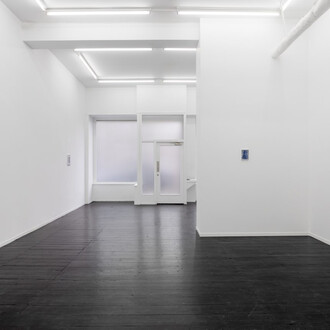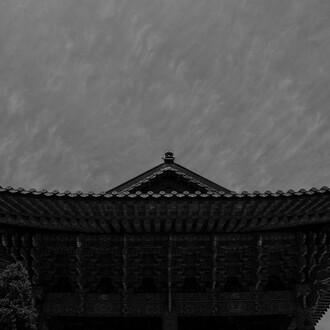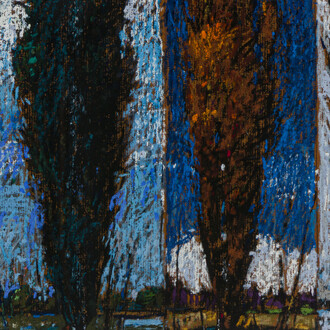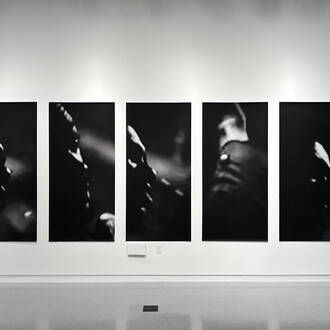Margot Samel presents Analog Mountain, by Merike Estna. This is the Estonian-born, Mexico City-based artist’s first solo exhibition with the gallery. In the work, themes of family, climate, and representation are troubled through a series of works that emerge from an interest in historic lineages of art and logic at play in structuring our present day.
The title of the exhibition is drawn from 20th-century French novelist René Daumal’s Mount Analogue: A Novel of Symbolically Authentic Non-Euclidean Adventures in Mountain Climbing. The allegorical story, unfinished in the writer’s lifetime, follows a group of mountaineers as they work to climb Mount Analogue, an enormous mountain on a surreal continent, invisible and inaccessible to the outside world, and only perceived by applications of obscure knowledge. A mountainous and cavernous terrain is the artist’s point-of-view for this body of work– a series painted as though peering from the mouth of a cave, each describing a record of time painted onto the walls of the enclosure. Some works emerge as doubled paintings, both portrait and cave-like paintings so that the viewer may locate themselves, in these works, inside the mountain itself.
Many of the painting’s subjects reference scenes iconic to art history: Botticelli’s Birth of Venus in Prehistoric origin, hands pulled from Dieric Bouts’ Virgin and Child in Night Sky, and a veiled Madonna and Child from Giovanni Bellini’s Madonna and Child in A Star. These visual artifacts of history sit atop crackled backgrounds. In other works, more personal to the artist, references to landscape and the natural environment, as well as intimate family memories are made. Rays of light shine down upon lava-like landscapes in The Vallery and The Mountain, a lizard perches atop a boulder with a menacing gaze in Earthquake.
This pairing of themes connects the genres of knowledge recorded and repeated in the pillars of art history, to climate anxiety and the symbolic accumulation of knowledge in the present. The double-looking, both peering out and looking inward, makes one wonder if the landscape they look out to is barren, as it appears? Like the mountain, it may only be seen to us in retrospect, not by foresight. Only by realizing that one has traveled further in traversing it than one would by traveling in a straight line, can one plot a course forward.
Working at the end of the nineteenth century, William Morris championed an art of the everyday, insisting that upon returning to the crafts of the world’s past, one might find dignity without scarcity, graced to everyone. Although not seeking a kind of return in this series, Merike’s work holds an interest in what is sacred and what is plentiful– what is graced to the masses, and what is reserved for the few. Throughout Analog Mountain Estna’s use of allegory, the natural environment, and personal narrative, forms a way of critiquing and reflecting on who the subject of art is, and what that does for how we represent the world ongoing.
(Text by Emily Small)
Merike Estna’s recent solo and two-person exhibitions include: Soil will not contain our Love, curated by Karin Laansoo, Kai Art Center, Tallinn (2022); Talk to me softly, when the world is fading away; Galería Karen Huber, Mexico City (2022); The House of the Tragic Poet, Bosse & Baum, London (2021); Borderlessness, with Jaime Lobato, Hasanlu Armastajad, Temnikova & Kasela, Tallinn (2021); Nightfall / Videvik, Publics, Helsinki (2021); Ghost of the Future, Filled With Memories of Past, curated by Andreas Nilsson, Moderna Museet, Malmö (2019); Mother of Pearls, Karen Huber, Mexico City (2019); Disposable Gloves Guide, kim? Contemporary Art Centre, Riga (2018); Dawn of the Swarm, Bosse & Baum, London (2018); Soft Scrub, Hard Body, Liquid Presence, with Maria Metsalu, curated by Maria Arusoo, Art in General, New York (2017–2018); Fragments from the shattered toe, curated by Thomas Cuckle, Kunstraum, London (2017); and, Red Herring, Chart Social, Copenhagen (2017).
Other exhibitions include: On Becoming Fluid, with Keef Winter, Hardwick Gallery, University of Gloucestershire, Gloucestershire (2017); and Blue Lagoon, KUMU Art Museum, Tallinn (2014). Selected group exhibitions include: Growing Out? Growing Up?, curatedby Olga Temnikova, Contemporary Art Collecting in the Baltics, Zuzeum Art Centre, Riga (2022); Tienda de Memorias / Memory Shop, Casa Wabi, Oaxaca, Mexico (2021); Open Collections: The Artist Takes the Floor, curated by Eha Komissarov, KUMU Art Museum, Tallinn (2019); A Situation, curated by Andreas Nilsson, Tallinn City Gallery, Tallinn (2019); 13th Baltic Triennial, curated by Vincent Honoré, Tallinn Art Hall, Tallinn (2018); Flaming Creatures, curated by Juste Jonetyte, Rupert, Vilnius (2018); Groundhog Day, curated by Andreas Nilsson, SIC, Helsinki (2017-18); Doublethink: Double vision, curated by Alistair Hicks, Pera Museum, Istanbul (2017); (In)visible Dreams and Streams, curated by Maija Rudovska, Contemporary Art Centre, Vilnius (2016); and Freundschafsspiel, curated by Didem Yazici, Museum für Neue Kunst Freiburg, Freiburg (2016).
















